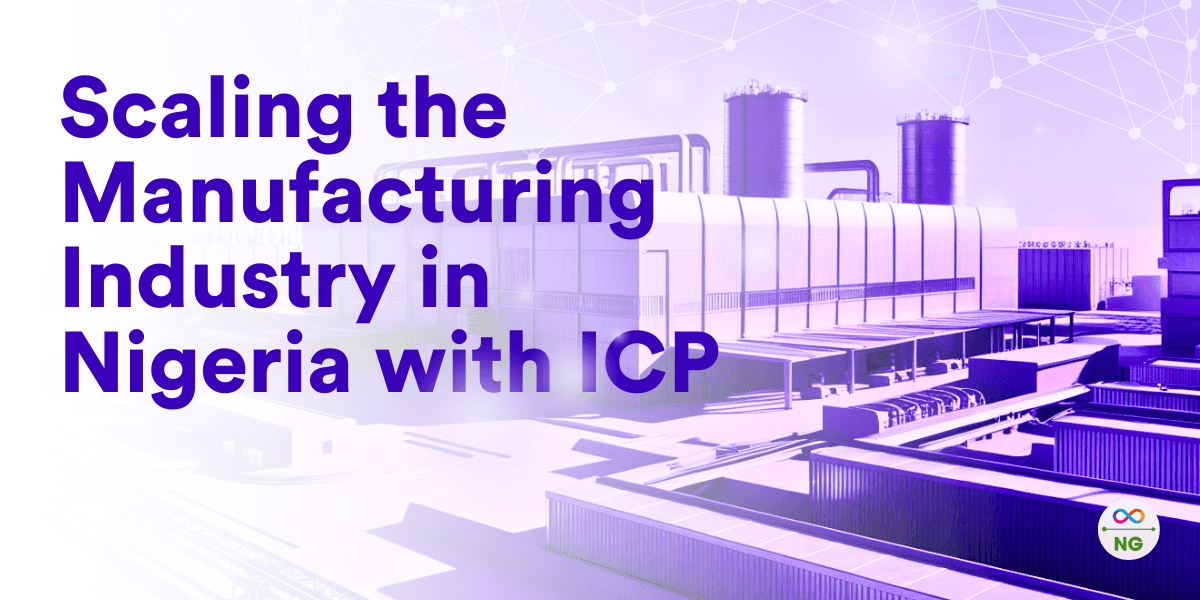
Nigeria's economic diversification hinges significantly on its manufacturing sector. This industry is a major GDP contributor, creating jobs, generating wealth, and enhancing government revenue. Beyond these benefits, reducing reliance on oil is essential, as well as improving the trade balance and enhancing the nation's competitive standing. In short, manufacturing is a powerful driver of positive economic change for Nigeria.
The trends in the manufacturing sector, including key industries such as automotive, consumer goods, petrochemicals and pharmaceuticals, reveal new, diverse opportunities for local and international investors.
The industry is evolving, yet it still faces critical challenges. Administrative bottlenecks, counterfeiting, lack of transparency, and weak supply chain systems often hinder growth. However, a technological shift is underway—one that offers more than just hope. Blockchain technology is quietly revolutionising the manufacturing sector, and ignoring it could mean missing out on the next big leap.
What is Blockchain in the Manufacturing Industry?
Blockchain in manufacturing refers to the use of decentralized, immutable ledgers to enhance transparency, efficiency, and security in production processes. Unlike traditional databases that can be altered or manipulated, blockchain ensures that records remain unchangeable and accessible to authorized stakeholders.
The Internet Computer Protocol (ICP), for instance, takes this even further, offering a scalable and decentralized platform that allows manufacturers to build secure, on-chain applications without the cost burden of traditional cloud services.
How Blockchain Technology Improves Manufacturing Industry
The adoption of blockchain in manufacturing opens the door to streamlined operations. It minimises fraud, enhances supply chain management, and introduces automation that can cut down unnecessary administrative costs. Manufacturing firms leveraging blockchain can create smart contracts that automatically execute transactions based on predefined conditions, ensuring smooth operations without delays from intermediaries.
Blockchain in Manufacturing Can Reduce Administrative Expenses and Entry Barriers
One of the biggest setbacks in Nigerian manufacturing is the high cost of compliance, administrative processes, and middlemen. Blockchain eliminates unnecessary paperwork, allowing real-time tracking of transactions, automated compliance verification, and reduced reliance on intermediaries. This is particularly beneficial for small and medium-sized enterprises (SMEs) looking to enter the market but are discouraged by excessive bureaucracy.
Blockchain’s Immutable Nature Can Ensure Stability by Preventing Arbitrariness in Manufacturing Data and Ensuring Product Quality
Manufacturers often struggle with data inconsistency, leading to costly errors and conflicts. Blockchain eliminates this issue by ensuring that once data is entered, it cannot be altered without consensus. This level of stability is critical in maintaining quality control, tracking raw materials, and ensuring compliance with industry standards.
Ensuring product quality should also not be an afterthought, yet many manufacturers struggle with quality control due to inconsistent tracking systems. Blockchain simplifies this by maintaining an immutable record of quality assurance checks, making it easier to verify compliance and address defects promptly.
Blockchain Improves Transparency and Trust in Manufacturing Transactions
Trust remains a major concern in Nigeria’s manufacturing industry. Whether it’s verifying the authenticity of raw materials or ensuring that transactions are fair, blockchain provides a solution. Manufacturers can utilise transparent, immutable records to build trust with suppliers, investors, and customers. Imagine a system where you can track the origin of every component used in your product, guaranteeing its authenticity.
Blockchain Technology Enhances Security
Cybersecurity threats are becoming more sophisticated, and manufacturers need to stay ahead. Blockchain’s decentralized nature makes it resistant to hacks and data breaches, ensuring that sensitive manufacturing data remains secure. With ICP’s advanced cryptographic security, Nigerian manufacturers can protect intellectual property and prevent unauthorized access to production secrets.
Enhanced Tracking and Tracing in Manufacturing
Counterfeit goods pose a significant problem in the Nigerian market, affecting everything from pharmaceuticals to automotive parts. Blockchain enables seamless tracking of products from the point of origin to the final consumer. This means that manufacturers can not only authenticate their products but also prevent illicit trade and ensure compliance with regulatory standards.
Blockchain Technology is Critical in Intellectual Property Protection and Monetization
For manufacturers investing in innovation, intellectual property (IP) protection is non-negotiable. Blockchain provides a tamper-proof mechanism to register and track patents, ensuring that inventors receive due credit and monetisation opportunities. Smart contracts can also be leveraged to automate royalty payments, reducing disputes over IP ownership.
Supply Chain Management and Blockchain Technology in Manufacturing
The efficiency of a manufacturing process heavily depends on supply chain reliability. Blockchain enhances supply chain management by enabling real-time tracking of goods, automating supplier payments, and reducing the risks associated with fraud and delays. With ICP’s decentralized computing power, manufacturers can even develop tailored supply chain solutions that operate seamlessly across global networks.
Scale Your Manufacturing Industry Projects with ICP
The conversation about blockchain in manufacturing is no longer theoretical; it’s happening in real-time. Entrepreneurs, manufacturers, and stakeholders need to start leveraging these technologies to stay competitive.
Scaling a manufacturing business in Nigeria is no small feat though, but the right technology makes a difference. The Internet Computer Protocol (ICP) provides the necessary tools to automate operations, reduce costs, and enhance trust through fully on-chain, tamper-proof smart contracts. Whether you’re a startup or an established manufacturer, building on ICP is not just an option—it’s the future of decentralized manufacturing.
The future belongs to those who are willing to adapt, innovate, and integrate. ICP offers the infrastructure to make this happen seamlessly. Let’s build this future together, one decentralized application at a time.
The ability to reduce administrative burdens, track goods seamlessly, and enhance security positions blockchain as a game-changer in the industry. The question is not whether blockchain will redefine manufacturing—it’s whether Nigerian manufacturers will embrace it fast enough to lead the revolution.
Article By: Mana Lamja